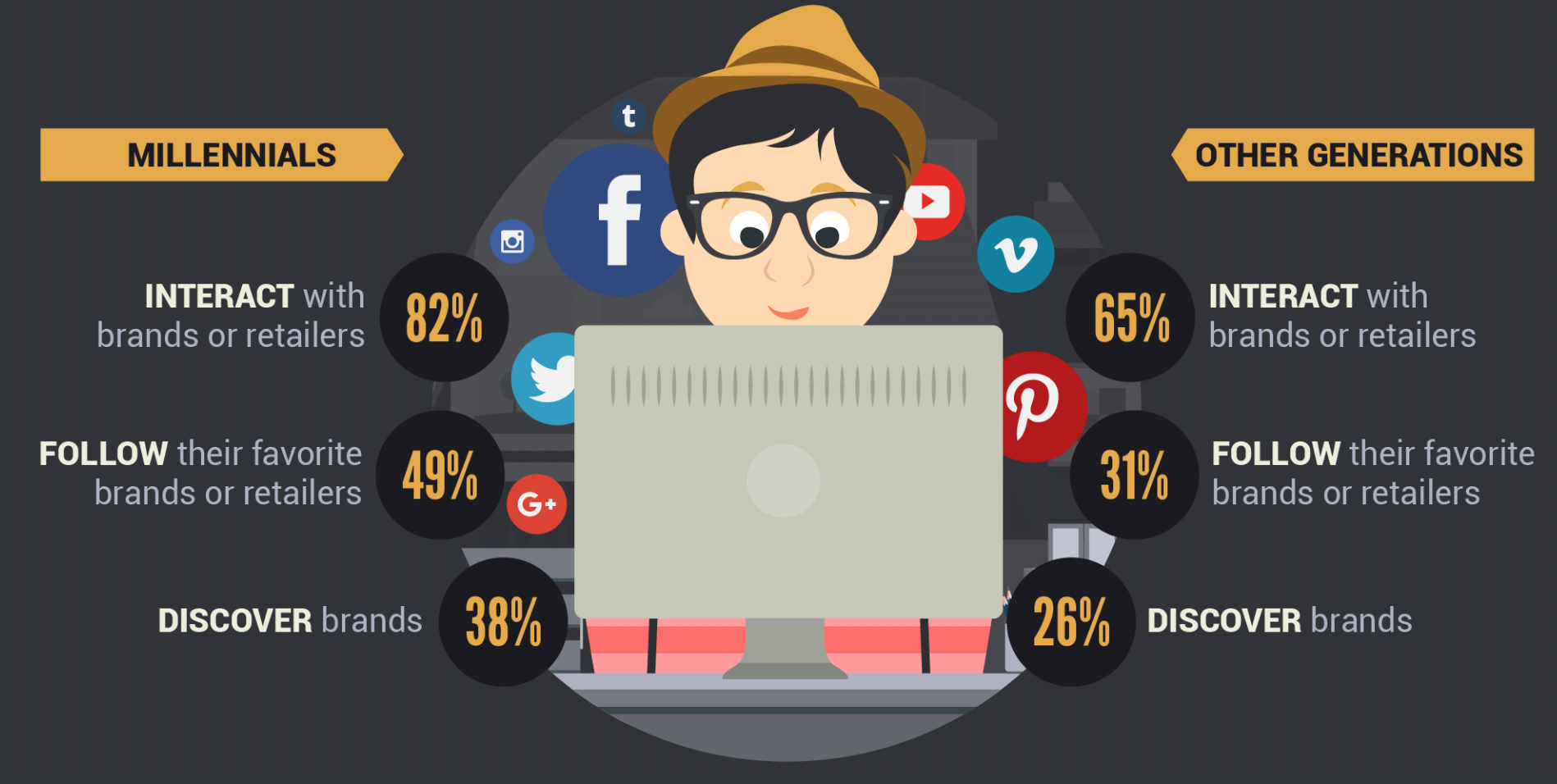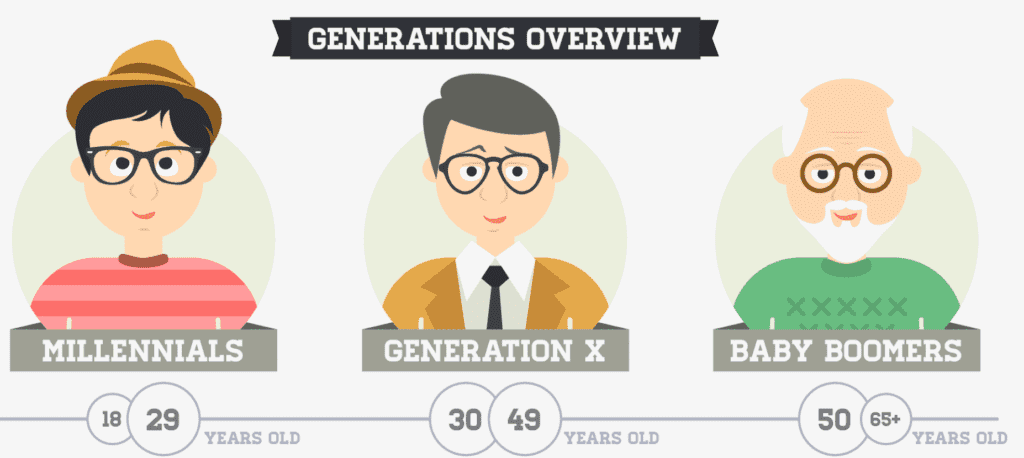Statistics on Millennials’ Consumer Behavior
79% of millennials claimed that advertisements are a vital source for every brand in 2023.
72% of Generation Y preferred loyalty programs for their favorite brands.
60% of millennials remained loyal to their particular brands for over 10 years.
The purchasing decisions of around 57% of millennial women are influenced by the brand’s value and social proof.
35% of male millennials have an average spending of nearly $5,000.
In 2023, 31% of millennials preferred a 3-star rating for a brand.
Social Media Statistics for Millennials
Among millennials, Snapchat is the most used social media application, followed by TikTok (91%) and YouTube (87%). Instagram has 83% usage, while Twitter and Facebook have the same percentage at 71%.
As of 2023, 90.4% of millennials are active social media users.
70% of millennials are currently engaged with YouTube and Facebook.
In the US, nearly 54% of older millennials are daily Instagram users.
44% of American millennials prefer product advertisements on social media platforms for gifts.
72% of millennials prefer customized advertisements over general ads.
Around the world, 70% of millennials trust brands that create product videos.
51% of Gen Z uses social media to pass the time.
43% of millennials are interested in breaking news.
61% of millennials use social media for communication with friends and family.
47% of Gen Z uses social media to stay informed about trends.
68% of millennials value a seamless and integrated internet platform.
90% of millennials make spontaneous purchases without checking reviews.
By the age of 30, 42% of millennials own houses, compared to 48% of Gen X.
86% of millennials spend more than anticipated on holiday gifts.
Technology Statistics for Millennials
One-third of millennials have used virtual reality at least once.
73% of millennials feel that technology has positively impacted their work-life balance.
50% of millennials use tablets, while laptops or PCs are the most commonly used devices for work and study (78% for millennials and 81% for Gen X).
85% of millennials use smartphones, the most preferred electronic device.
In the US, 31% of millennials prefer reading magazines, while 48% of baby boomers and 35% of Gen X read them.
48% of baby boomers, 32% of Gen X, and 20% of millennials prefer reading newspapers offline.
Spending Statistics for Millennials
There are 72 million millennials in the US in 2023.
In North America, 36% of millennials invest in stocks, categorized as high (29%), medium (33%), and low (33%) buying power.
86% of millennials overspend on holiday gifts.
Impulsive purchasing is done by 64% of millennials.
38% of homebuyers are millennials.
49% of millennials prefer spending on food over saving for the future.
A social media usage graphic by generations:

(Source: appliedpsychologydegree.usc.edu)
80% of millennials believe that advertisements are essential for brand awareness.
58% of Gen Z watch advertisements to support their influencers.
46% of millennials have no opinion about ads.
44% of millennials prefer promoting products for monetary gains.
47% of Gen Z feel social media networks guide them to shopping sites.
57% of younger generations compare online and offline prices before making a purchase.
77% of younger generations think that the economy affects their spending and saving.
In the US, 77% of people connect with brands through social media.
15% of millennials prioritize owning a car, while 25% consider it a need but not a priority.
91% of US millennials prefer brands associated with a cause.
Baby boomers spend on healthcare, reading materials, and personal care; Gen X on pensions, entertainment, holidays, and insurance; millennials on education, transportation, entertainment, vacations, shopping, and dining.
US millennials spend $600 billion annually and have a global purchasing power of $1.4 trillion.
60% of millennials plan to increase their
Customer satisfaction leads to brand loyalty.
Online purchasing saw a 34% increase across all generations post-pandemic.
60% of millennials have remained loyal to the same brand for a decade or more.
In the USA, 54% of baby boomers utilize Instagram for social interactions.
The younger generation tends to open brand messages within 90 seconds but may not respond immediately or at all.
Conclusion
The similarity in behavior among Gen Z individuals across different countries underscores the importance of crafting robust marketing strategies to resonate with both older and younger demographics. The pervasive influence of technology in today’s society underscores the necessity for companies to integrate technological aspects into their marketing endeavors. Given that millennials represent the future consumer base, understanding market dynamics and trends is imperative, albeit challenging.
[3px] border-t-[3px] p-4 border-[#1d598f] my-4″ style=”box-shadow: 0 0 14px rgb(9 38 66 / 8%);”>
Sources
Is millennial marketing difficult?
Effectively executing millennial marketing requires tailored strategies to align with this demographic.
Does millennial marketing solely focus on technology?
Technology plays a pivotal role as millennials prioritize tech-driven solutions. Integrating technology, particularly in social media, is key to meeting their expectations.
How can millennial marketing be made more effective?
Adhering to current trends and understanding the needs of Gen Z is instrumental in enhancing millennial marketing effectiveness.
Is social media the primary channel to reach millennials?
While not the only avenue, social media remains a vital platform due to its prevalence among the younger audience. Optimizing communication through effective channels is key to successful strategies.
Millennial Marketing Statistics
The data presented spans from 2023 to 2024, with forecasts extending to 2025, 2026, 2027, and 2028.
——
REFERENCES:
This information was taken from various sources around the world, including these countries:
Australia, Canada, USA, UK, UAE, India, Pakistan, Philippines, Indonesia, Nigeria, Tanzania, Kenya, US, United Kingdom, United States of America, Malaysia, U.S., South Africa, New Zealand, Turkey, United Arab Emirates.
Afghanistan, Albania, Algeria, American Samoa, Andorra, Angola, Anguilla, Antarctica, Antigua and Barbuda, Argentina, Armenia, Aruba, Australia, Austria, Azerbaijan.
Bahamas, Bahrain, Bangladesh, Barbados, Belarus, Belgium, Belize, Benin, Bermuda, Bhutan, Bolivia, Bosnia and Herzegovina, Botswana, Bouvet Island, Brazil, British Indian Ocean Territory, Brunei Darussalam, Bulgaria, Burkina Faso, Burundi.
Cambodia, Cameroon, Canada, Cape Verde, Cayman Islands, Central African Republic, Chad, Chile, China, Christmas Island, Cocos (Keeling Islands), Colombia, Comoros, Congo, Cook Islands, Costa Rica, Cote D’Ivoire (Ivory Coast), Croatia (Hrvatska), Cuba, Cyprus, Czech Republic.
Denmark, Djibouti, Dominica, Dominican Republic, East Timor, Ecuador, Egypt, El Salvador, Equatorial Guinea, Eritrea, Estonia, Ethiopia, Falkland Islands (Malvinas), Faroe Islands, Fiji, Finland, France, Metropolitan, French Guiana, French Polynesia, French Southern Territories.
Gabon, Gambia, Georgia, Germany, Ghana, Gibraltar, Greece, Greenland, Grenada, Guadeloupe, Guam, Guatemala, Guinea, Guinea-Bissau, Guyana, Haiti, Heard and McDonald Islands, Honduras, Hong Kong, Hungary, Iceland, India, Indonesia, Iran, Iraq, Ireland, Israel, Italy.
Jamaica, Japan, Jordan, Kazakhstan, Kenya, Kiribati, North Korea, South Korea, Kuwait, Kyrgyzstan, Laos, Latvia, Lebanon, Lesotho, Liberia, Libya, Liechtenstein, Lithuania, Luxembourg.
Macau, Macedonia, Madagascar, Malawi, Malaysia, Maldives, Mali, Malta, Marshall Islands, Martinique, Mauritania, Mauritius, Mayotte, Mexico, Micronesia, Moldova, Monaco, Mongolia, Montserrat, Morocco, Mozambique, Myanmar.
Namibia, Nauru, Nepal, Netherlands, Netherlands Antilles, New Caledonia, New Zealand (NZ), Nicaragua, Niger, Nigeria, Niue, Norfolk Island, Northern Mariana Islands, Norway.
Oman, Pakistan, Palau, Panama, Papua New Guinea, Paraguay, Peru, Philippines, Pitcairn, Poland, Portugal, Puerto Rico, Qatar, Reunion, Romania, Russia, Rwanda, Saint Kitts and Nevis, Saint Lucia, Saint Vincent and The Grenadines, Samoa, San Marino, Sao Tome and Principe.
Saudi Arabia, Senegal, Serbia, Seychelles, Sierra Leone, Singapore, Slovakia, Slovenia, Solomon Islands, Somalia, South Africa, South Georgia and South Sandwich Islands, Spain, Sri Lanka, St. Helena, St. Pierre and Miquelon, Sudan, Suriname, Svalbard and Jan Mayen Islands, Swaziland, Sweden, Switzerland, Syria.
Taiwan, Tajikistan, Tanzania, Thailand, Togo, Tokelau, Tonga, Trinidad and Tobago, Tunisia, Turkey, Turkmenistan, Turks and Caicos Islands, Tuvalu, Uganda, Ukraine, United Arab Emirates (UAE), UK (United Kingdom), USA (United States of America, U.S.), US Minor Outlying Islands.
Uruguay, Uzbekistan, Vanuatu, Vatican City State (Holy See), Venezuela, Vietnam, Virgin Islands (British), Virgin Islands (US), Wallis and Futuna Islands, Western Sahara, Yemen, Yugoslavia, Zaire, Zambia, Zimbabwe.
Millennial Marketing Statistics
August 19, 2024
Source link : http://www.bing.com/news/apiclick.aspx?ref=FexRss&aid=&tid=66cb599d250342d5b3e604cb9f584d2c&url=https%3A%2F%2Fhollywoodgazette.com%2Fmillennial-marketing-statistics-html%2F&c=1081036479861968330&mkt=en-us
Author :
Publish date : 2024-08-15 18:37:00
Copyright for syndicated content belongs to the linked Source.
